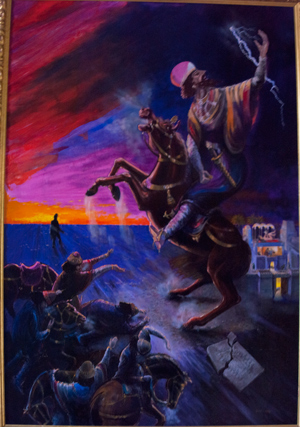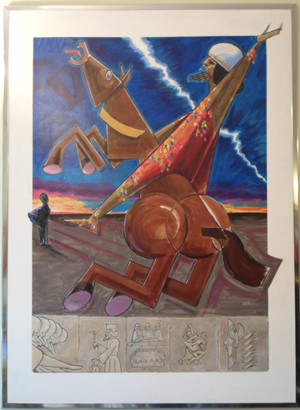Click on the painting to see the larger versions
|
An essay on a notable happening, over two and a half thousand years ago, demonstrates just how old this problem is, despite it being sickeningly repeated again and again down through the centuries. I hope my painting, however miniscle its influence, will help sharpen the mind of the viewer toward solutions to a problem as old as humanity, let us choose to alter our attitude to the art of living and condition it with a perspective of the history of choice behind it. The following is based on an historical account by Herodotus, in "The Histories". Whether this is a completely true account or part fable, only the most learned classical scholars can advise. Whether my interpretation is completely accurate in detail I neither know nor care. I have unashamedly taken artistic licence to show how Herodotus' account has fired my imagination to encapsulate all the elements that made this great event happen and how this mighty King came to sway the hearts and minds of his subjects, just as surely as our power figures of today have studied the lesson of history well, to manipulate us. Apply the lessons of history to your thoughts on the events of today and you have my picture, "The Choice". Brief Precis of the Herodotus Characters and Events Around 500 BC, Darius became King of Persia and its conquests, Asia and notably Eqypt. He achieved Kingship in a strange and prophetic way. The story starts in the reign of Cambyses, son of Cyrus. Cambyses defeated the Pharaoh Amasis and ended the last of a long line of dynasties ruling Eqypt for over 3000 years. Cambyses subsequently became a deranged autocrat and among his many cruel and aimless commands, he secretly had his brother, Smerdis, spirited away and killed, without any of his court knowing. This eventually resulted, after many years, to his deathbed confession that there was no heir to the throne. No one would believe him, thinking that this was yet again a manifestation of his cruel and twisted mind. The servant who had carried out his command and did the deed, on being questioned, vehemently denied his part in the assassination, knowing he would be killed in retribution for his part in the deed whether he was believed or not. However, two Magi, who had been a party to this secret, decided that one of them should impersonate the brother, Smerdis, because nobody would be able to compare identities after his long banishment from the kingdom and, coupled with the fact that the chosen Magi also had a reasonable likeness to Smerdis, this should enable him to claim the throne with little trouble. He took precautions to preserve his true identity by setting up a closed court, allowing no access, and especially to hide the fact that, for a previous misdemeanour, Cambyses had had this Magi's ears chopped off! On taking the throne, after much speculation and after a vision to one of the Magis of seven hawks pursuing a vulture, the Magi impersonating Smerdis acquired all the possessions of Cambyses, including his wives. One of these wives, being a sister to a group of conspirators, was tasked to discover whether her new master still had his ears. She took the opportunity, when he mounted her in his bed, such that in the height of his climax, she was able to unobtrusively, indeed confirm that he had no ears. She later revealed to all that, in fact he was not Smerdis, a true Persian, but from the clan of the Magus. Darius with six other conspirators devised a way to break into the closed palace. Darius slayed the impostor and, with the earless head, convinced all the doubters that they had all been deceived. The seven conspirators swore allegiance to each other and then debated on just how the kingdom should be ruled, to avoid the mistakes of the past, ruinous years. The seven conspirators were Darius, Otanes, Gobryas, Aspathines, Intaphrenes, Megabyzus and Hydarnes. Otanes was the first to suggest that a popular government be chosen by the people instead of a line of kings being imposed on the people, for the time had passed for absolute power without responsibility or control of law. He said that monarchs were always filled with pride and envy, which in the end led them to believe that they were gods. Megabyzus recommended an Oligarchy (the rule of a chosen few) because the masses were feckless and the country would be reduced to the brutality of the rabble. Darius spoke last. He agreed with all that the others had said but councelled that there were but three choices which should be considered:- 1. Democracy for they had all been tried and tested. He spoke out in favour of Monarchy. He said that one ruler is impossible to improve on, provided he is the very best. His government will be more secret from enemies and traitors, preventing them from gaining advantage, which is the great weakness in other forms of government and has proven disastrous throughout the ages. He said that in the case of an Oligarchy, a number of ambitious men are competing for distinction in a public service leading to violient personal feuds and personal quarrels, which breed factions, in turn leading to civil wars and endless bloodshed. Lastly, in a democracy, malpractices abound, with corrupt dealings, unscroupulous factions manipulating in the name of freedom to breed endless nationalistic schisms, leading to closed associations mutually supporting one another until the people's champion appears and routs the cliques, soon finding himself entrusted with absolute power. He asked where we could get our freedom from? He answered that we are set free by one man - a Monarch. They all agreed that Darius was right, with the exception of Otanes, who had urged equality before the law. Otanes asked to withdraw, as it was obvious that they should choose a Monarch from among them. Otanes wanted to remain a freeman, not ruled but obeying the law of Persia. They all agreed and he withdrew. After much discussion and consultation of the omens they decided on how the choice would be made. They would meet on the following morning outside the city walls, mounted on horseback. Upon the moment of the rising of the sun, the first horse that whinnied would signal that its rider would be chosen as Monarch, with all the others bearing true allegiance to him alone. Darius returned to his home and consulted with his groom Oebares on a cunning plan to ensure his would be the first horse to whinny and the groom assured him he would be easily able to make Darius' stallion speak out for him. The groom knew that the stallion favoured a mare in the stables and, during the dead of night, led the mare to the chosen place outside the city walls, where the event was to take place and tethered her to the spot. He then took the stallion out toward the the same place but only allowed the stallion to slowly approach the mare in a wide spiral. Catching her scent aroused a tremendous desire in the stallion which was heightened by a long anticipation. He let this reach a fever pitch of desire before he allowed the stallion to mount the mare. He then led both horses back, stabling them separately. On the following morning before the meeting, he rubbed his hand over the mares genitals and, masking the scent under his coat, he placed himself up wind of the horses, as the contenders sat there waiting. At the first showing of the sun, he uncovered his hand. The stallion immediately caught the scent and the memory of his previous desire and at once called out to be reunited with the mare. As the sun rose, the cry of the stallion combined with a mightly crash of thunder and flash of lightening, confirming a truly auspicious choice and the remaining five threw themselves to the ground in awe of their new Monarch, Darius! How The Story Relates To Des' Painting Des says, "The scene in the picture then, as I envisage it, is a boundless desert plain. The sun is just rising to the far left of the picture, lighting the awakening of this new, momentous day in its rosy glow, breaking through the bottom of a towering storm cloud. Strewn on the desert are typical artefacts, as perceived by me, of that era. They will depict the seven hawks chasing a vulture, as in the prophesy, the symbols depicting various forms of government and the earless head of the Magi. The desert floor will show the hoof prints of the stallion circling the mare on the previous night culminating in a stain on the ground where the union took place. The whole scene is dominated by Darius' horse, rearing up, wild eyed, its nostrils flaring and its mouth opened wide, calling for yet another union, as its erection is signalling. On its back, Darius is seen with triumphal satisfaction on the success at his ruse to become one of the greatest rulers of all time. The great thundercloud affirms his accession with a mightly clap of thunder and flash of lightening, which highlights his majestic omnipresence in a blue, steely light. To the far left is seen Oebares holding back his robe to allow the mare's scent to so excite the stallion. In the foreground are the five conspirators, confirming that Darius is now their King and throwing themselves into submission to the overwhelming portent of the moment. Here then is the background to my picture, 'The Choice' ".
|

